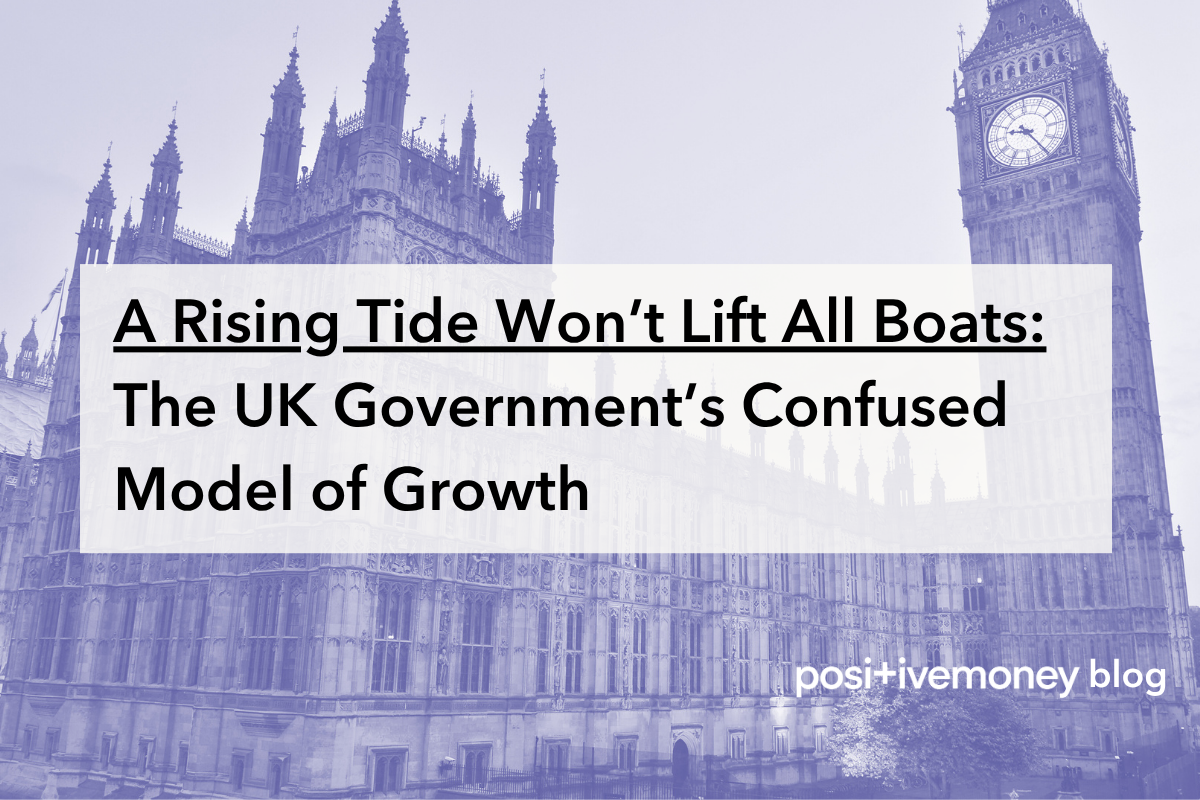
UKGlobal
27 January 2026
On top of wider problems with the desirability and feasibility of growth, the UK’s government’s current model of growth leans alarmingly on private finance and is ill-equipped to deliver social wellbeing.
Having examined the negative impacts and dwindling feasibility of growth, this blog zooms in to look specifically at the UK government’s current centering of growth as a policy objective. Evaluation of the government’s growth narrative - even on its own terms - reveals a confused and financialised model of growth, which is unlikely to meaningfully address key challenges of widening socio-economic inequality and ecological breakdown.
Before Labour was elected into government in July 2024, when Rachel Reeves was still Shadow Chancellor, she employed several speeches and op-eds in an effort to carve out a distinct economic philosophy that she said she would bring into government. She named this philosophy ‘securonomics’. She first publicly elaborated on the concept of securonomics in a speech at the Peterson Institute in Washington, DC, on 24th May 2023.
In her speech, Reeves described openly the extent to which securonomics was inspired by the Biden Administration’s ‘modern supply-side economics’, and the Inflation Reduction Act (IRA) in particular. The concept’s name derives from its proclaimed central focus on establishing national economic security. Central to securonomics, she argued, was “forging a new partnership between an active state and dynamic open markets…with the goal of making hard work pay for working people in Britain once again”. Seeking to distinguish her own approach from the orthodoxy of the preceding decades, she criticised “trickle down” economics which she said has in fact led to a “steady flow upwards”. Reeves spoke of rebuilding the UK’s “industrial strength”, and evening out investment across regions, with a specific focus on “green technologies of the future”. Notably, she also made a point of tying securonomics to Labour’s goal of achieving the highest sustained growth in the G7.
In this moment, then, securonomics - with its emphasis on “good jobs, decent pay, strong public services” and green investment - appeared to constitute a very different economic offer to the austerity of Conservative governments which preceded Labour’s 2024 election victory. Yet, since Labour has taken office, the early ambitions of securonomics appear to have been sidelined, and the government’s growth narrative has shifted in character. For example, Labour watered down or abandoned flagship commitments such as a £28 billion annual green investment package before even entering office, and in government have brought forward controversial cuts, including to the winter fuel allowance for pensioners and disability benefits.
Reeves and Labour have argued that the wider economic context has forced them to alter their plans. Firstly, the global economic environment shaped by the Biden Administration and the IRA - which so inspired Reeves - has given way to a second Trump Presidency which is mobilising a wider backlash against progressive social and environmental initiatives, and has made global economic shockwaves through the implementation of significant trade tariffs.
Domestically, Reeves declared upon becoming Chancellor the discovery of a £22 billion fiscal “black hole” left by the Conservatives, which - in combination with high interest rates - the government argued has put it in a more difficult fiscal position than expected. Yet, at the same time, the government has continually rebuked calls to raise revenues through taxes on wealth, including from Labour MPs. A critical reading might suggest therefore that, once exposed to the pressures of government, more popular and progressive elements of Labour’s initial programme have been sacrificed to appease more powerful lobbying interests.
Some have also proposed that Labour under Starmer and Reeves has no coherent model of growth, despite making it such a central objective of their government, and despite the early promises of securonomics. Oxford Politics Professor Ben Ansell has argued that, in comparison to a range of recent UK political figures from both left and right, the current government lacks a clear theory of growth, writing:
Securonomics might fit well with a neokeynesian approach that emphasised maintained public spending plus social investment, or with a developmentalist approach that was more protectionist - but it’s not clear these two models actually work with one another [...] and that’s before we question how you are supposed to reconcile securonomics with a neoclassical, market-conforming approach to public finances, or with a disruptive approach to AI, […] or with a supply-side, rip-it-all-up approach to planning.
Reeves’ neoclassical approach to public finances appears particularly influential in the changing shape of Labour’s growth narrative since entering government, and the shift away from the early vision of securonomics. In the first month of her chancellorship, Reeves made a statement to parliament in which she inverted a famous quote of John Maynard Keynes. In 1942, speaking on public finances and state capacity, Keynes had argued that “anything we can actually do, we can afford”. In 2024, on the same subject, Reeves’ telling adaptation was to claim that “if we cannot afford it, we cannot do it”.
In line with this hawkish fiscal stance, to the extent that the government does have a model of growth, it has so far been grounded in the theory of using relatively small amounts of public money to leverage in much larger amounts of private finance. Labour has accordingly gone to great lengths - both before entering government and subsequently - to court the support of private financial institutions. Exemplifying this is the close relationship it has been developing with BlackRock, the world’s largest asset manager, which oversees around $10tn of assets. Following Labour’s election, the business secretary Jonathan Reynolds wrote in an email to BlackRock that he looked forward to working with the institution to “change the face of our UK”.
The government has set out an aim to grow the UK’s financial sector whilst enhancing the sector’s contribution to wider economic growth. This aim is contradictory even on its own terms, given research that suggests the City’s continued expansion has led to an extraction of wealth from other parts of the economy, rather than enhancing it. Yet, maintaining the course set by previous Conservative governments, Labour has stated its ambition to deregulate the financial sector, with growth the proclaimed rationale.
The government is particularly focused on ushering in private investment in UK infrastructure. This raises the alarming prospect of key infrastructure being operated in service of corporate profit and shareholder returns, rather than public utility. One need only look to the recent state of sectors such as energy, water, and rail in the UK to see the damaging impacts such privatised motives of operation can have on vital utilities and infrastructure, including price gouging and deteriorating quality of service.
For this reason, the economist Daniela Gabor has criticised the government’s approach as centred around ‘derisking’, and warned against the prospect of ‘Britain rebuilt by BlackRock’. Derisking involves the state using its capacity to make the risk-return profile of an investment opportunity more favourable to private finance, enabling private investors to reap the majority of any profits generated while the state (and by extension, taxpayer) is left liable to step in and bear the costs if things go wrong. It is concerning that early statements from the government around the National Wealth Fund and Great British Energy - two of its flagship initiatives - suggest that these will follow a derisking approach.
One of the first indicative products of the government’s private finance-led growth model was the announcement of a £10 billion investment from the US private equity firm Blackstone (not to be confused with BlackRock) to build an AI data centre in the North East of England. Such developments, and the wider prospect of shifting the balance of ownership of UK infrastructure further into the hands of private finance, do not seem like logical choices of a government and chancellor developing a policy programme which prioritises national economic security. Rather, they appear to tilt back towards the ‘trickle down’ model previously chastised by Reeves.
As discussed in the previous blog post in this series, wider economic headwinds are already blowing against the government’s growth plans. Added to this, on current evidence, any small amount of growth the government might manage to scrabble together seems unlikely to deliver on the securonomics promise of geographically and socio-economically well-distributed wealth and opportunities.
So what might a policy agenda truly oriented towards building robust and widespread economic security look like? It must be centred around major public investment in the key sectors and services that are so formative of most people’s everyday experience and wellbeing - healthcare, education, housing, and transport - and moving towards more democratic and publicly accountable ownership structures that direct wealth back into communities that most need it, rather than funneling returns away to transnational financial institutions. Further crucial pillars would be stabilising prices of essential goods and services (including through price caps), implementing taxes on extreme wealth to address the widening inequality crisis, and transformative investment in green transition which will underpin any semblance of security far into the future.
Over recent years, a growing body of examples point to a common political trajectory in countries where nominally progressive governments fail to implement sufficiently bold policies that generate a tangible improvement to the majority’s sense of wellbeing and economic security. As seen in the US and numerous European countries, this trajectory involves the far-right becoming an ascendant political - and even governing - force. For this reason, the economist Isabella Weber has argued that liberal and progressive governments must take seriously the need to implement an “anti-fascist economics”, characterised by policies such as those mentioned in the previous paragraph.
As a nominally centre-left party in power, the UK Labour government must heed this warning; it still has time to stop the UK following this same trajectory. But its current self-declared ‘obsession’ with growth will not stave off this fate, and as the purported benefits of growth continue to ring hollow for much of the population, demand for a radical alternative will only become more vociferous.
This is the third blog in a three part series, read the first on the social and environmental harms of growth here, and the second on the decreasing feasbility of growth here.
Sign-up to our mailing list for regular updates, or donate to support our work to redesign our economic system for social justice and a liveable planet.
